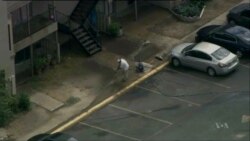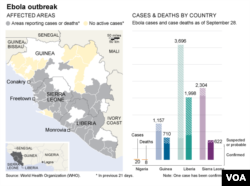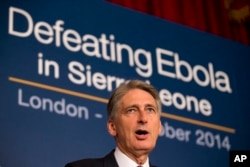Up to 100 people may have had direct or indirect contact with the first person to be diagnosed with the deadly Ebola virus in the United States, and four of his relatives have been quarantined in their homes as a precaution, Texas health officials said Thursday.
Dallas County officials said 12 to 18 people had direct contact with the Texas patient,who has been identified as Liberian national Thomas Eric Duncan, and they in turn had contact with scores of others.
Centers for Disease Control and Prevention Director Tom Frieden said most of the 100 people have been interviewed and the CDC has identified only a handful of individuals so far who may really have been exposed to Ebola and therefore will be monitored.
Erikka Neroes, a spokeswoman for the Dallas County health department, said none of those being monitored were showing symptoms of the disease, which include fever, uncontrollable bleeding, vomiting and diarrhea and spreads through contact with bodily fluids such as blood or saliva.
Duncan was diagnosed with the Ebola virus on Sunday. He is in isolation at a Dallas hospital, where his condition is listed as serious but stable.
Possible prosecution
Also Thursday, Liberian authorities said Duncan will be prosecuted when he returns home for lying on his airport screening questionnaire.
With an Ebola epidemic raging in West Africa, passengers leaving Liberia are being screened for fever and are asked if they have had contact with anyone infected.
On the form obtained by The Associated Press and confirmed by a government official, Duncan answered "no" to questions about whether he had cared for an Ebola patient or touched the body of someone who had died in an area affected by Ebola.
Days before he left Liberia, Duncan had helped carry to a taxi a pregnant woman who later died of Ebola, according to neighbors and reported by AP. Her illness at the time was believed to be pregnancy-related.
US measures
Public health authorities have been calling on U.S. health care workers to screen patients for signs of illness, question patients about their travel history and rule out Ebola for those who have been to West Africa, where more than 3,000 people have died in the epidemic.
“Unfortunately, that did not happen in this case,” said Dr. Anthony Fauci, head of the National Institute of Allergy and Infectious Diseases. “We just need to put that behind us and look ahead and make sure that in the future that doesn't happen again.”
Duncan flew to Texas from Liberia via Brussels and Washington. He arrived in the United States on September 20, and five days later went to the hospital with a low-grade fever and abdominal pain.
CNN reported that a Dallas woman who had a child with Duncan said he had sweated profusely in the bed they shared at her apartment. She said the sheets where he had lain were still on the bed.
Hospital officials said Duncan told an emergency room nurse he had come from Liberia, but admitted his travel information had not been shared with other staff who were treating him.
Duncan was sent home with antibiotics but returned two days later.
‘Defeating Ebola’ conference
Also on Thursday, Britain made a plea for international help to deal with the world's worst Ebola outbreak at the start of a conference in London, with one charity warning that five people are being infected with the virus every hour in Sierra Leone.
British Foreign Secretary Philip Hammond called for "decisive action" to fight the Ebola outbreak in West Africa, urging countries to increase financial aid as well as provide other vital help including medical expertise, transport and supplies.
Hammond told the "Defeating Ebola" conference Thursday in London that such action could save hundreds of thousands of lives and prevent the crisis from getting further out of control.
“We’re at a tipping point in the management of this Ebola outbreak, we've got more than 20 countries coming together here and we’re hoping that the commitments and the pledges that are made today will allow us to make a step change in our response, get ahead of the curve so that we can contain and then beat this disease," he said.
Sierra Leone's President Ernest Bai Koroma, due to attend Thursday's conference, had to cancel because of technical problems with his plane.
Ebola has killed at least 3,338 in West Africa - mainly in Sierra Leone, Guinea and Liberia - out of 7,178 cases as of September 28, the World Health Organization (WHO) said, and cases have been recorded elsewhere, including in the United States.
'Simply wrong'
Even with the rise in cases reported by WHO, Liberia's President Ellen Johnson Sirleaf said the Ebola crisis is stabilizing in her country and new data will soon prove that warnings from U.S. and U.N. experts of tens of thousands of cases were “simply wrong.”
The comments, made to France 24's English news channel late on Wednesday, follow forecasts from the WHO that 20,000 people could be infected with Ebola by early November.
The U.S. Centers for Disease Control has warned of hundreds of thousands of cases if swift action is not taken.
“We are beginning to see a stabilization - even in Monrovia, which has been hit the hardest,” Johnson Sirleaf said, referring to Liberia's capital city.
Liberia has recorded the most deaths - nearly 2,000 - and aid agencies said they still need hundreds of beds for Ebola patients in the capital.
The lack of beds means Ebola patients are being turned away and sent back to their communities, further spreading the infection.
However, Sirleaf rejected the negative warnings.
“I am waiting for the next projections and I hope they will admit that they've just been simply wrong, that all of our countries are getting this thing under control,” she said.
Although WHO said the total number of new cases had fallen for a second week, it warned of under-reporting and said there were few signs of the epidemic being brought under control.
“Transmission remains persistent and widespread in Guinea, Liberia and Sierra Leone, with strong evidence of increasing case incidence in several districts,” the WHO said.
Getting a jump on donations
Britain and Sierra Leone arranged the event to spotlight the scale of the outbreak and ask for international support ahead of a donor conference planned for later this month.
Britain is the top international donor to Sierra Leone and has taken the lead on trying to combat the crisis there. It has pledged $200 million and has also provided nearly 150 new treatment beds and promised around 600 more in the coming months.
Aid group Save the Children highlighted the lack of treatment capacity in Sierra Leone, saying treatment facilities there currently offer only 327 beds.
Justin Forsyth, chief executive of Save the Children, said nurses are a major priority.
“We need to get nurses and in these countries there was only a thousand nurses before this crisis in Sierra Leone, a country of 6 million people. And even less than that in Liberia," Forsyth said. "So we need to act now and the people are the critical part of this as well as the money.”
The latest WHO figures report 788 new cases of Ebola in Sierra Leone in the past three weeks.
Save the Children warned that even with the Britain's planned aid, more capacity will be needed to avoid having infected people staying at home and risking passing the virus on to their families.
Aid cuts
In a critical report published on Monday, British politicians said international aid cuts to Sierra Leone and Liberia have compromised the fight against the virus.
Britain’s Department for International Development, or DFID, had planned to cut its bilateral budget for the two countries by a fifth between the 2013-14 fiscal year and 2015/16.
International Development Committee chairman Sir Malcolm Bruce told VOA that Britain must stand by its long-term commitments to these countries.
“For countries like this that are emerging out of conflict, we really have to work with them over years to build up an effective health system so that they can manage both the normal day-to-day disease that they face and also have the resilience to deal with a crisis like this, which clearly has overwhelmed them," Bruce said.
Selah Hennessy contributed to this article from London. Some material for this report came from Reuters and AP.








